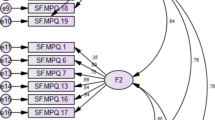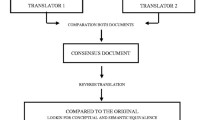Abstract
The translation of existing pain measurement scales is considered important in producing internationally comparable measures for evidence based practice. In measuring the pain experience, the short-form of McGill’s pain questionnaire (SF-MPQ) is one of the most widely used and translated instruments. The purpose of this study was to examine whether the Turkish version of the SF-MPQ is a valid and reliable tool to assess pain and to be used as a clinical and research instrument. Translation retranslation of the English version of the SF-MPQ was done blindly and independently by four individuals and adapted by a team. Eighty-nine rheumatological patients awaiting control by a rheumatologist were assessed by the Turkish version of the SF-MPQ in the morning and in the afternoon of the same day. Internal consistency was found adequate at both assessments with Cronbach’s alpha 0.705 for test and 0.713 for retest. For reliability of the total, sensory, affective, and evaluative total pain intensity, high intraclass correlations were demonstrated (0.891, 0.868, 0.716, and 0.796, respectively). Correlation of total, sensory and affective score with the numeric rating scale was tested for construct validity demonstrating r = 0.637 (p < 0.001) for test and r = 0.700 (p < 0.001) for retest. Correlation with erythrocycte sedimentation rates for concurrent validity was found to be r = 0.518 (p < 0.001) for test and r = 0.497 (p < 0.001) for retest. The results of this study indicate that the Turkish version of the SF-MPQ is a reliable and valid instrument for the measurement of pain in Turkish speaking patients with rheumatoid arthritis.
Similar content being viewed by others
References
Georgoudis G, Watson PJ, Oldham JA (2000) The development and validation of a Greek version of the short-form McGill Pain Questionnaire. Eur J Pain 4(3):275–281
de C Williams AC, Davies HT, Chadury Y (2000) Simple pain rating scales hide complex idiosyncratic meanings. Pain 85(3):457–463
Melzack R (1975) The McGill Pain Questionnaire: major properties and scoring methods. Pain 1(3):277–299
Georgoudis G, Oldham JA, Watson PJ (2001) Reliability and sensitivity measures of the Greek version of the short form of the McGill Pain Questionnaire. Eur J Pain 5(2):109–118
Deschamps M, Band PR, Coldman AJ (1988) Assessment of adult cancer pain: shortcomings of current methods. Pain 32(2):133–139
Burckhardt CS, Bjelle A (1994) A Swedish version of the short-form McGill Pain Questionnaire. Scand J Rheumatol 23(2):77–81
Melzack R, Terrence C, Fromm G, Amsel R (1986) Trigeminal neuralgia and atypical facial pain: use of the McGill Pain Questionnaire for discrimination and diagnosis. Pain 27(3):297–302
Lazaro C, Caseras X, Whizar-Lugo VM et al (2001) Psychometric properties of a Spanish version of the McGill Pain Questionnaire in several Spanish-speaking countries. Clin J Pain 17(4):365–374
van der Kloot WA, Oostendorp RA, van der Meij J, van den Heuvel J (1995) The Dutch version of the McGill pain questionnaire: a reliable pain questionnaire. Ned Tijdschr Geneeskd 139(13):669–673
Melzack R (1987) The short-form McGill Pain Questionnaire. Pain 30(2):191–197
Grafton KV, Foster NE, Wright CC (2005) Test–retest reliability of the Short-Form McGill Pain Questionnaire: assessment of intraclass correlation coefficients and limits of agreement in patients with osteoarthritis. Clin J Pain 21(1):73–82
Dudgeon D, Raubertas RF, Rosenthal SN (1993) The short-form McGill Pain Questionnaire in chronic cancer pain. J Pain Symptom Manage 8(4):191–195
Truong PT, Abnousi F, Yong CM et al (2005) Standardized assessment of breast cancer surgical scars integrating the Vancouver Scar Scale, Short-Form McGill Pain Questionnaire, and patients’ perspectives. Plast Reconstr Surg 116(5):1291–1299
Grachev ID, Fredrickson BE, Apkarian AV (2002) Brain chemistry reflects dual states of pain and anxiety in chronic low back pain. J Neural Transm 109(10):1309–1334
Richards SC, Scott DL (2002) Prescribed exercise in people with fibromyalgia: parallel group randomised controlled trial. BMJ 325(7357):185
McCaffrey R, Freeman E (2003) Effect of music on chronic osteoarthritis pain in older people. J Adv Nurs 44(5):517–524
Lynch ME, Clark AJ, Sawynok J (2003) A pilot study examining topical amitriptyline, ketamine, and a combination of both in the treatment of neuropathic pain. Clin J Pain 19(5):323–328
Khan SA, Apkarian AV (2002) The characteristics of cyclical and non-cyclical mastalgia: a prospective study using a modified McGill Pain Questionnaire. Breast Cancer Res Treat 75(2):147–157
Jamison M, Neuberger GB, Miller PA (2003) Correlates of falls and fear of falling among adults with rheumatoid arthritis. Arthritis Rheum 49(5):673–680
Schmidt S, Bullinger M (2003) Current issues in cross-cultural quality of life instrument development. Arch Phys Med Rehabil 84(4 Suppl 2):S29–S34
Beaton DE, Bombardier C, Guillemin F, Ferraz MB (2000) Guidelines for the process of cross-cultural adaptation of self-report measures. Spine 25(24):3186–3191
Childs JD, Piva SR, Fritz JM (2005) Responsiveness of the numeric pain rating scale in patients with low back pain. Spine 30(11):1331–1334
Paice JA, Cohen FL (1997) Validity of a verbally administered numeric rating scale to measure cancer pain intensity. Cancer Nurs 20(2):88–93
Len C, Goldenberg J, Ferraz MB et al (1994) Crosscultural reliability of the childhood health assessment questionnaire. J Rheumatol 21(12):2349–2352
Shehab D, al-Jarallah K, Moussa MA (1998) Validation of the Arabic version of the health assessment questionnaire (HAQ) in patients with rheumatoid arthritis. Rev Rhum Engl Ed 65(6):387–392
Blake DR, Robson P, Ho M et al (2006) Preliminary assessment of the efficacy, tolerability and safety of a cannabis-based medicine (Sativex) in the treatment of pain caused by rheumatoid arthritis. Rheumatology (Oxford) 45(1):50–52
Zalon ML (1999) Comparison of pain measures in surgical patients. J Nurs Meas 7(2):135–152
Dechow E, Davies RK, Carr AJ et al (1999) A randomized, double-blind, placebo-controlled trial of sclerosing injections in patients with chronic low back pain. Rheumatology (Oxford) 38(12):1255–1259
Ruta DA, Hurst NP, Kind P et al (1998) Measuring health status in British patients with rheumatoid arthritis: reliability, validity and responsiveness of the short form 36-item health survey (SF-36). Br J Rheumatol 37(4):425–436
Bae SC, Cook EF, Kim SY (1998) Psychometric evaluation of a Korean Health Assessment Questionnaire for clinical research. J Rheumatol 25(10):1975–1979
Fransen J, Langenegger T, Michel BA, Stucki G (2000) Feasibility and validity of the RADAI, a self-administered rheumatoid arthritis disease activity index. Rheumatology (Oxford) 39(3):321–327
Salaffi F, Stancati A, Silvestri A et al (2005) Validation of the Italian versions of the Bath Ankylosing Spondylitis Functional Index (BASFI) and the Dougados Functional Index (DFI) in patients with ankylosing spondylitis. Reumatismo 57(3):161–173
Lee SS, Park MJ, Yoon HJ et al (2006) Evaluating the Korean version of the Multidimensional Health Assessment Questionnaire in patients with rheumatoid arthritis. Clin Rheumatol 25(3):353–357
Author information
Authors and Affiliations
Corresponding author
Appendix. Turkish version of the short-form McGill pain questionnaire
Appendix. Turkish version of the short-form McGill pain questionnaire

Rights and permissions
About this article
Cite this article
Yakut, Y., Yakut, E., Bayar, K. et al. Reliability and validity of the Turkish version short-form McGill pain questionnaire in patients with rheumatoid arthritis. Clin Rheumatol 26, 1083–1087 (2007). https://doi.org/10.1007/s10067-006-0452-6
Received:
Accepted:
Published:
Issue Date:
DOI: https://doi.org/10.1007/s10067-006-0452-6




